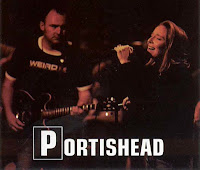Portishead may not have invented trip-hop, but they were among the first to popularize it, particularly in America. Through slow, elastic beats, cool jazz, acid house, and soundtrack music, Portishead created an atmospheric, alluringly dark sound.
Before Portishead released their debut album, Dummy, in 1994, trip-hop's broad appeal wasn't apparent, but the record became an unexpected success in Britain, topping most year-end critics polls and earning the prestigious Mercury Music Prize; in America, it also became an underground hit, selling over 150,000 copies before the group toured the U.S. Following the success of Dummy, legions of imitators appeared over the next two years.
Named after the West Coast shipping town where Geoff Barrow grew up, Portishead formed in Bristol, England, in 1991. Prior to the group's formation, Barrow had worked as a tape operator at the Coach House studio. Around the time of Portishead's formation, he had begun to earn a reputation as a remix producer, working on tracks by Primal Scream, Paul Weller, Gabrielle, and Depeche Mode.
Barrow met Beth Gibbons, who had been singing in pubs, in 1991 on a job scheme. Over the next few years, the pair began writing music, often with jazz guitarist Adrian Utley.
Portishead's first album Dummy was recorded with engineer Dave MacDonald, who played drums and drum machines, and guitarist Utley, who rounded out Portishead's lineup.Despite the band's aversion to press coverage, the album was successful in both Europe and the United States .Melody Maker, Mixmag, and The Face named Dummy as 1994's album of the year, and early in 1995, "Glory Box" debuted at number 13 without any radio play.Dummy spawned three singles: "Numb", "Sour Times", "Glory Box", and won the Mercury Music Prize in 1995.
In 2003, the album was ranked number 419 on Rolling Stone magazine's list of the 500 greatest albums of all time. The album cover features a still from the band's own short film To Kill a Dead Man.Around the same time, "Sour Times" entered regular rotation on MTV in America. Within a few weeks, Dummy and "Sour Times" were alternative rock hits in the U.S. Back in the U.K., the album had crossed over into the mainstream, becoming a fixture in the British Top 40.
Following the Mercury Music Prize award, Barrow retreated to Coach House to begin work on Portishead's second album. The self-titled record finally appeared in September 1997. Three singles, "All Mine", "Over" and "Only You" were released, the first one achieving a Top 10 placing in the UK.
The live PNYC followed late the next year, a one-off show with strings by the New York Philharmonic orchestra which took place at the Roseland Ballroom in New York City the previous year.
In 1999, Portishead recorded the song "Motherless Child" with Tom Jones for his album Reload. For the next few years, Portishead went on hiatus, and Barrow, Utley and Gibbons worked on their own projects.
Portishead reconvened in 2005, performing their first live dates in seven years and recording material for their next album.
Their version of "Un Jour Comme un Autre (Requiem for Anna)" appeared on 2006's Serge Gainsbourg tribute Monsieur Gainsbourg Revisted, and in 2007 the band curated the Nightmare Before Christmas All Tomorrow's Parties festival.
In 2008, a decade after their last album, Portishead returned with Third, the trio's most challenging, unpredictable work yet. "Silence", "Hunter", "The Rip", "We Carry On", and "Machine Gun" are some notable songs from this album.On 9 December 2009, Portishead released the song "Chase the Tear" for Human Rights Day to raise money for Amnesty International UK.[19]
"Glory Box" was released in 1995. The title song samples "Ike's Rap II" by Isaac Hayes and it peaked # 13 in the UK charts.The music video features lead singer Beth Gibbons dressed as a man. The song is a love song, featuring the frequent refrain " Give me a reason to be a woman".

No comments:
Post a Comment